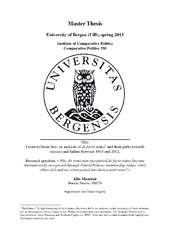I want to break free: an analysis of de facto-states1 and their paths towards success and failure between 1945 and 2012
Master thesis
Permanent lenke
https://hdl.handle.net/1956/7529Utgivelsesdato
2013-06-17Metadata
Vis full innførselSamlinger
Sammendrag
The thesis analyses de facto-states from the creation of the United Nation in 1945 until and including 2012. Twenty-three entities are identified, of which four have had success and become UN members, and ten have failed and become reintegrated into their parent state. Nine are still incomplete and have uncertain outcomes. Crisp set QCA and descriptive analyses are applied to investigate first which causal combinations lead to success or failure. These results are then used to analyse the entities without clear outcomes to identify which could be expected to succeed and fail. The causal conditions included are A: Ethnicity as state foundation, B: Level of democratic institutions as compared with the parent state, C: UN veto power opposition, D: UN veto power support, and E: Economic level significantly different from the parent state. Only weak combinational connections have been found though cs/QCA, but the descriptive analysis have identified three patterns. First, that the conflicts where economy have been an important factor tend to become resolved to a larger extent than those where this is not percieved as important.Second, that all the recognised entitiets are created outside of the two major state creation waves of decolonisation and the fall of the communist unions. Third, that which UN veto power that gets involved appears to be of importance. None of the entities Russia has supported have neither failed nor succeeded, but remain in a state of limbo. The reasons for this are unknown, but suggestions regarding realpolitical conciderations are made. The three analyses combined indicate that Somaliland and Puntland are the two entities in the strongest position to be recognised per 2012.
